
Museum Artifact: Jays Potato Chip Tin, 1950s
Made By: Jays Foods, Inc., 825 E. 99th Street, Chicago, IL [Pullman]
For over 75 years, Chicagoans have voraciously chomped away on handfuls of Jays Potato Chips—sharing in the communal assumption that some guy named Jay must have invented the salty snack for them back in the proverbial day. If you give it a closer look, however, the familiar Jays logo—with its conspicuous lack of an apostrophe—raises some questions. Turns out, there isn’t a “Jay.” Never was a Jay.
There was, however, a Japp.
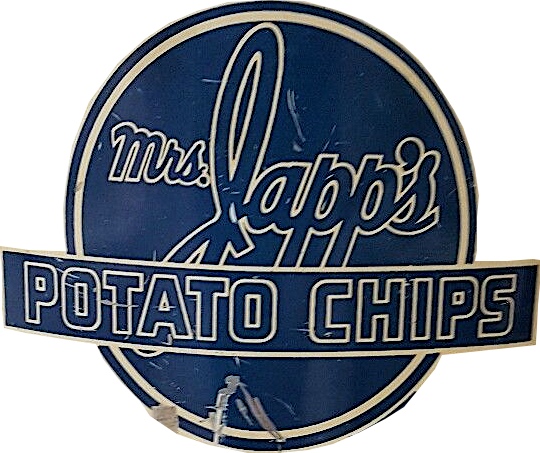
If you had to pick the worst possible time in American history for a fellow named Leonard Japp to start a company under his own last name, you might be inclined to go with 1941; the year the Japanese attack on Pearl Harbor instantly turned the J-word into the one-syllable ethnic slur du jour. In truth, though, poor Leonard managed to time things up even worse than that. He launched the “Mrs. Japp’s” brand of potato chip not in ’41, but in 1940, giving it ample time to establish a wide manufacturing base, grocer distribution, and local recognition BEFORE the war came to Hawaii.
“We got into that wrangle with the Japanese and the grocers started calling us immediately, asking us to get those chips out of their stores,” an elderly Mr. Japp recalled to the Chicago Tribune in 1985.
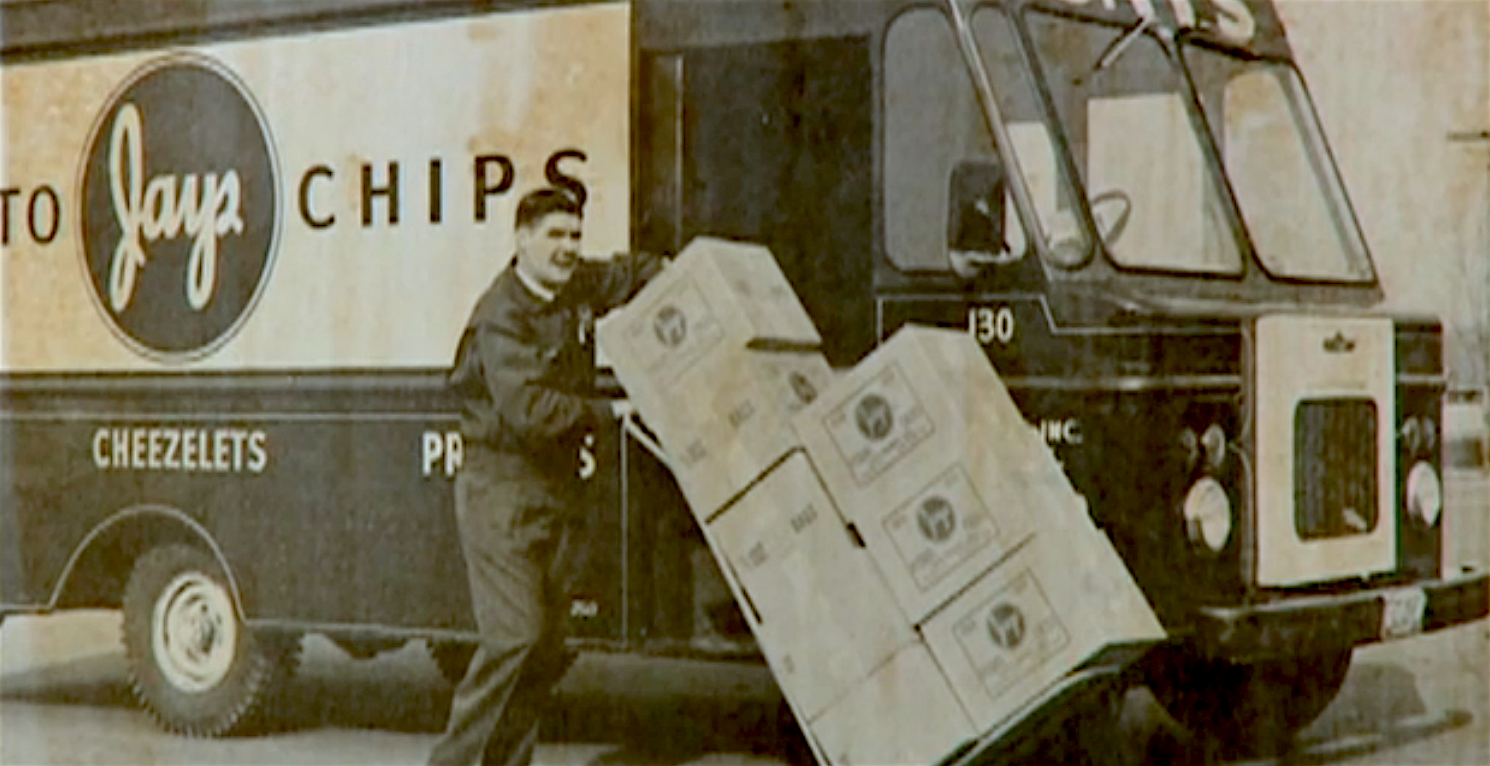
[Jays employee Jack C. Williams, circa 1960s]
After beating the odds and finding success as a Chicago snack merchant during the Depression, Japp had hit an unexpected snag in the road at the age of 35. His dream of a company with his own name on it (or I suppose his wife Eugenia’s name, since he called it “Mrs. Japp’s”) would have to be abandoned, and a new name would be needed lickety split.
“We wanted ‘Jax,’” Japp said, “but it was taken by a brewing company. ‘Jays’ was available. It took a couple of weeks, but we started putting tags on plain bags with the Jays name on it.”
And that, folks, is the origin story of the beloved Jays brand. It’s not only NOT a person’s name, it’s not even a fun reference to anything Chicagoie. It’s basically just a word that (a) started with the letter J, (b) sounded like the already established “Lay’s” brand name, and (c) was “available.”
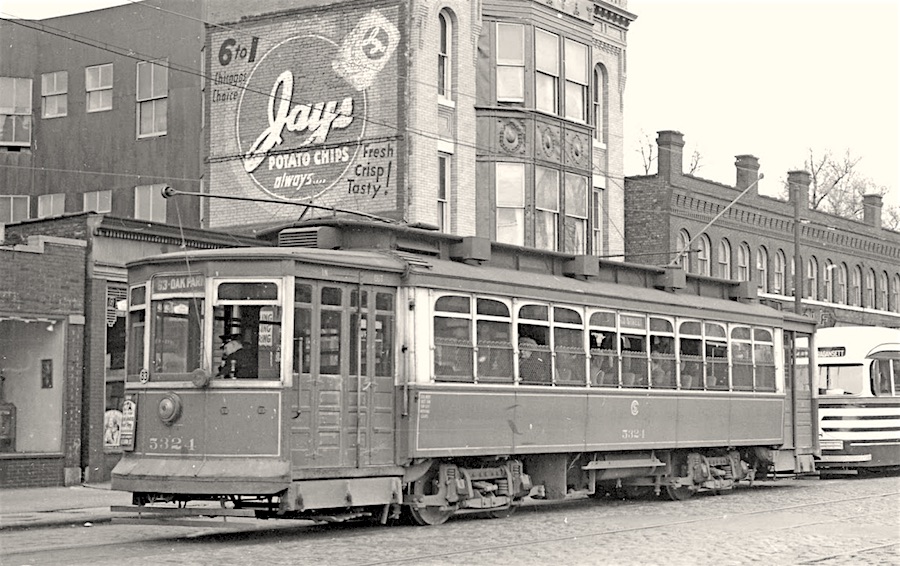 [An early 1940s Jays ad on a building touts the chips as being “Always Fresh, Crisp & Tasty!”]
[An early 1940s Jays ad on a building touts the chips as being “Always Fresh, Crisp & Tasty!”]
Fortunately, Leonard Japp—the person—was considerably more interesting than his nomenclature skills.
In an interview with a trade pub called Chipper Snacker in 1974, Japp said of his youthful days in Minnesota, “I was probably the meanest kid in town, as well as the poorest. It seems when you’re poor, you have to fight twice as hard to prove yourself. I worked hard. I cut lawns, shaved necks in barber shops, and picked coals off railroad tracks so my family would have enough to eat and enough heat to warm our house. It was a tough life, but we made out.”
As a teenager, Leonard hitched a ride on a train bound for Chicago, looking for the next buck. From there, his adventures routinely drift into tall-tale territory, complete with an over-abundance of celebrity cameos.
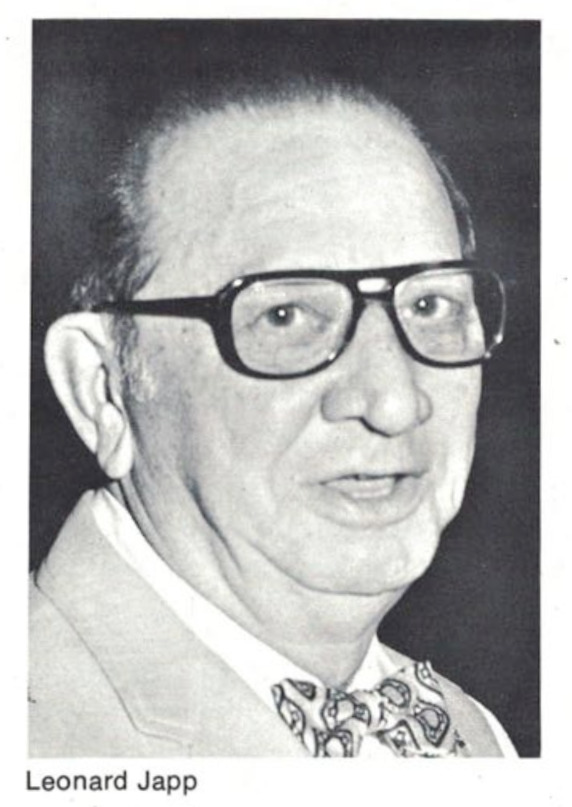 Depending on your sources and the enthusiasm of the storyteller, Japp supposedly spent time as a boilermaker, a bridge builder, a bouncer, a cemetery plot salesman, and a “steeplejack”—a guy who spends his days scaling clock towers and church spires, Batman-style, doing repair work. He was also apparently a lifeguard alongside future Tarzan screen star Johnny Weismuller, and a sparring partner of both heavyweight contender Buddy Baer and a young entertainer named Bob Hope. There was an inevitable Al Capone connection, too, of course.
Depending on your sources and the enthusiasm of the storyteller, Japp supposedly spent time as a boilermaker, a bridge builder, a bouncer, a cemetery plot salesman, and a “steeplejack”—a guy who spends his days scaling clock towers and church spires, Batman-style, doing repair work. He was also apparently a lifeguard alongside future Tarzan screen star Johnny Weismuller, and a sparring partner of both heavyweight contender Buddy Baer and a young entertainer named Bob Hope. There was an inevitable Al Capone connection, too, of course.
In 1927, Leonard Japp and his buddy George Gavora started their first food business, largely designed to cater to Chicago’s growing speakeasy underground and its rogue’s gallery of gangsters and flappers, all in need of smokes and something to nosh on.
“George and I knew about the speaks,” Leonard told the Tribune, “so we decided to buy an old broken down truck for five dollars down to sell pretzels, nuts, cigarettes, what they needed for sandwiches. Pretty soon, they started asking for potato chips. I didn’t know anything about potato chips.”
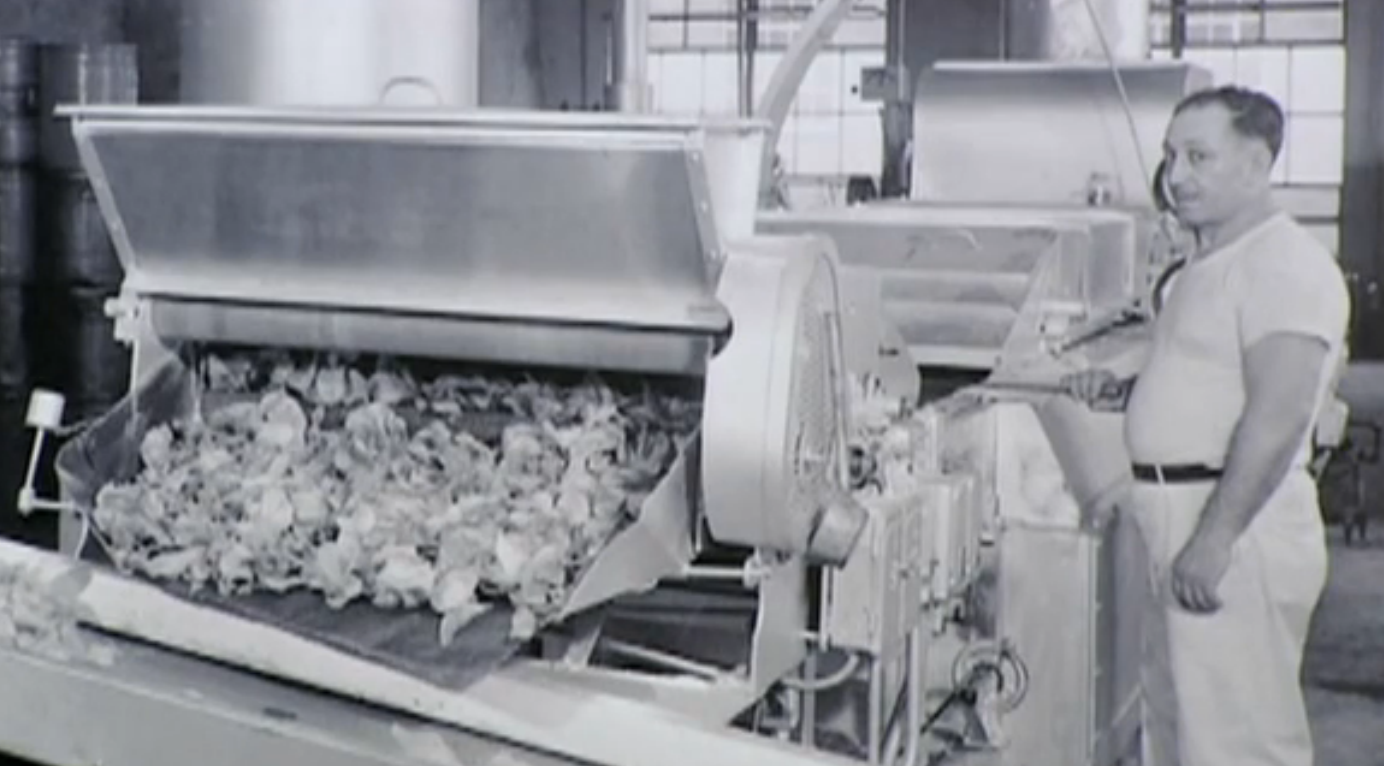 [An automatic potato chip making machine in operation, c. 1950s]
[An automatic potato chip making machine in operation, c. 1950s]
According to legend, it was Capone himself who’d come back from a trip to Saratoga Springs, New York—birthplace of the potato chip—and personally requested that Japp bring more of the salty delights to Chicago.
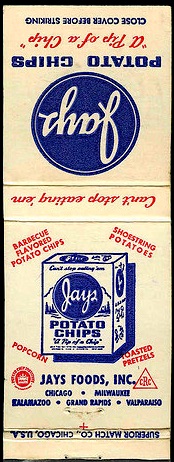 In any case, by 1929, the Japp & Gavora Food Co. (which is generally cited today as the starting point of Jays Foods Inc.) had become a self-made success story, expanding from one food truck to fifteen. Then, like so many other businesses born in the late ’20s bubble, the stock market crash put them back at square one.
In any case, by 1929, the Japp & Gavora Food Co. (which is generally cited today as the starting point of Jays Foods Inc.) had become a self-made success story, expanding from one food truck to fifteen. Then, like so many other businesses born in the late ’20s bubble, the stock market crash put them back at square one.
“We had our money in the Casper State Bank. When they went broke, everyone went broke with them.”
After some lost years roaming the earth, boxing all comers, and presumably teaching Shirley Temple how to dance, Leonard Japp re-emerged in the mid 1930s, ready to take another shot at the snack game. He got himself a new truck, loaded it with various chips, pretzels, and other goodies, and hit the pavement making sales.
By 1938, he’d formed a new partnership with a salesman from Kraft Foods, George Johnson, creating the Special Foods Co. Purely a distributor, the firm sold a wide assortment of edibles (including Rival brand dog food). Over time, though, with potato chips again emerging as their best cash cow, Japp and Johnson decided they’d had enough of buying their goods from other manufacturers, and bought themselves an $18,000 automatic potato chip making machine. Special Foods moved into a factory space at 40th Street and Princeton Ave., and started producing the aforementioned Mrs. Japp’s chip—one of the very first on the market to be fried in corn oil, creating a lighter snack than the old fashioned lard-dipped chip.
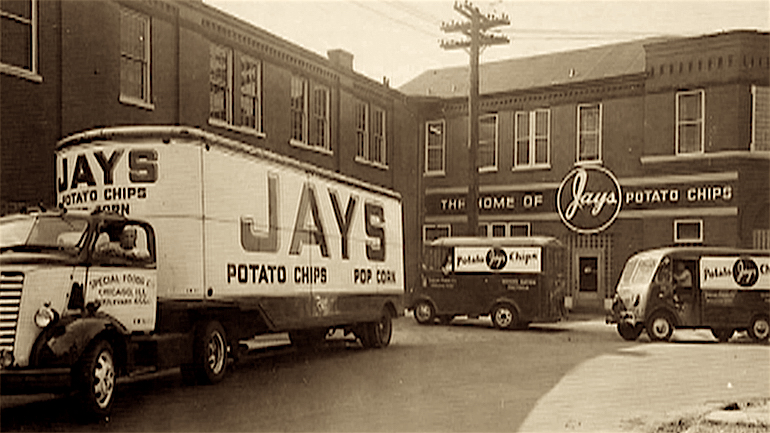 [This is likely the original Jays factory at 40th St. & Princeton Ave., c. late 1940s]
[This is likely the original Jays factory at 40th St. & Princeton Ave., c. late 1940s]
During the war years, a lot of Chicago food companies were starting to cannibalize one another to pool resources. In 1944, Leonard Japp and George Johnson were still doing fairly well, but surveying the landscape, they decided there wasn’t enough room in Special Foods for the two of them. So, in a ridiculous game of chicken, they agreed to make simultaneous bids to buy one another out—winner take all.
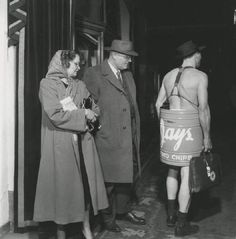
“We wrote our bids out on a piece of paper and agreed the higher one would win,” Japp said in 1985. “I wanted to bid $120,000, but my wife said that if we wanted to keep the company, we should bid $150,000. When we turned over the bids, George had bid $145,000.”
Bear in mind, this was an 80 year-old man describing events from 40 years in the past. Did it really go down like that? Who knows? But the result was that George Johnson was out, Special Foods was no more, and Jays Foods was born.
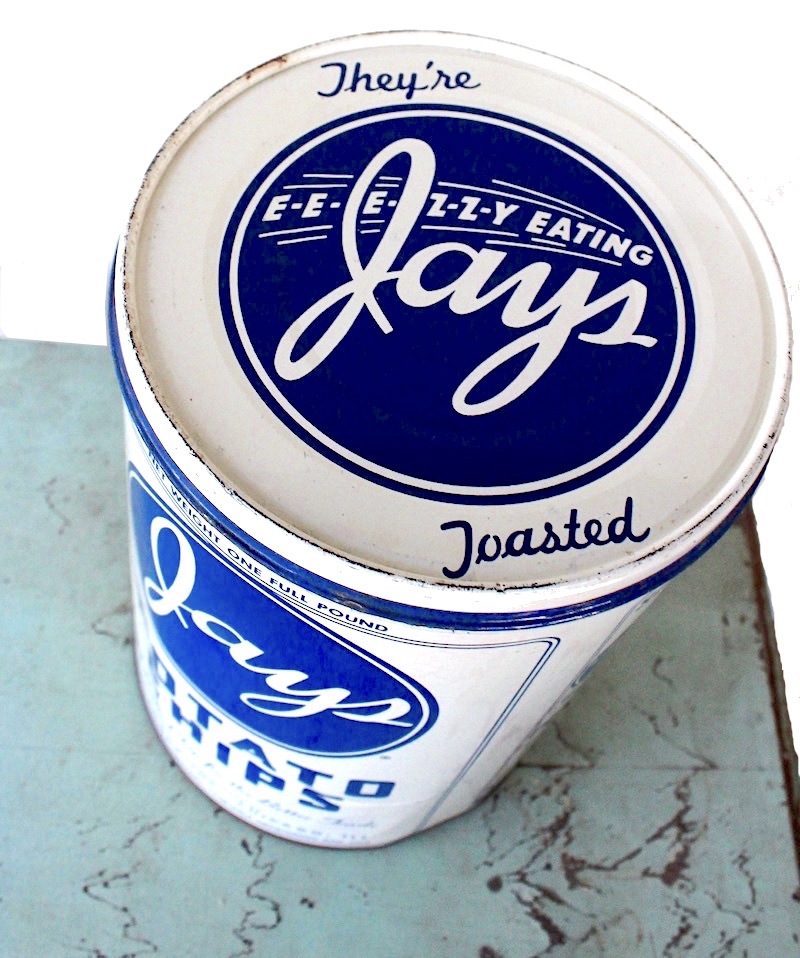
From early on, the blue and white Jays potato chip tin—like the one in our collection—was a common sight in grocery stores and kitchen cabinets, changing little in design from the ‘40s into the ‘50s and ‘60s. The slogan on the tin—“A Better Chip for the Better Trade”—was at least a step up from Jays’ other primary tagline: “Can’t Stop Eatin’ ‘Em” (another lazy ripoff of the Lay’s brand and its’ “Bet You Can’t Eat Just One”).
Once the contents of a tin were consumed, many people kept the cylinders as waste baskets or storage bins, meaning plenty of them stayed in circulation even after boxed and bagged variations made the store-bought 1 LB tin obsolete.
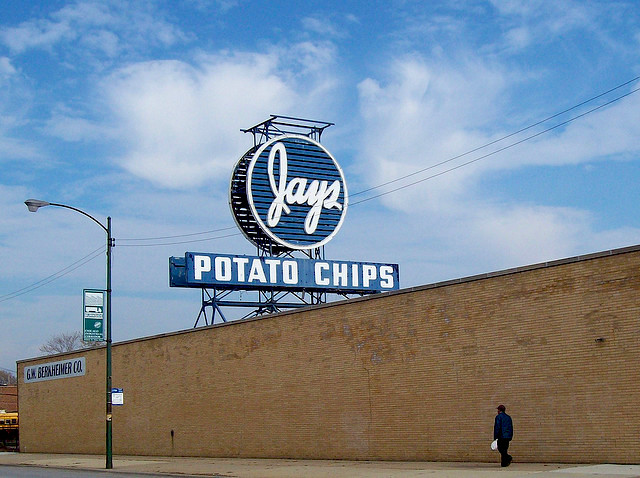 [Former Jays Foods factory at 825 E. 99th Street. Photo by Eliezer Appleton, Flickr.]
[Former Jays Foods factory at 825 E. 99th Street. Photo by Eliezer Appleton, Flickr.]
The chips themselves were being produced by state-of-the-art machines and a small army of workers at the sprawling Jays plant on 99th Street and Cottage Grove, opened in the mid 1950s. Here, Leonard kept a close eye on his crunchy empire, transforming a humble family business into the undisputed chip king of the Chicagoland market. He had profit sharing plans for his employees and free daily lunches, and the factory itself was a regular stop for local school field trips (the kids all got free lunches, too).
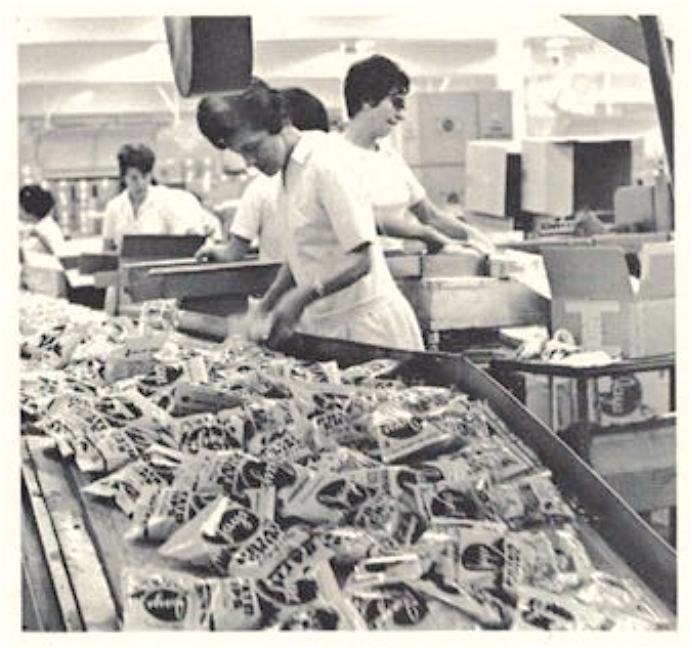 [Inside the Jays factory, c. 1960s]
[Inside the Jays factory, c. 1960s]
“If you worked here for a year or more, Mr. Japp knew you by your first name,” a former employee named Al Keetan once told the Tribune. “He’d come in around 7 a.m. with his big old briefcase and walk the floor, and the floor had to be clean or he’d shut down production until it was clean.”
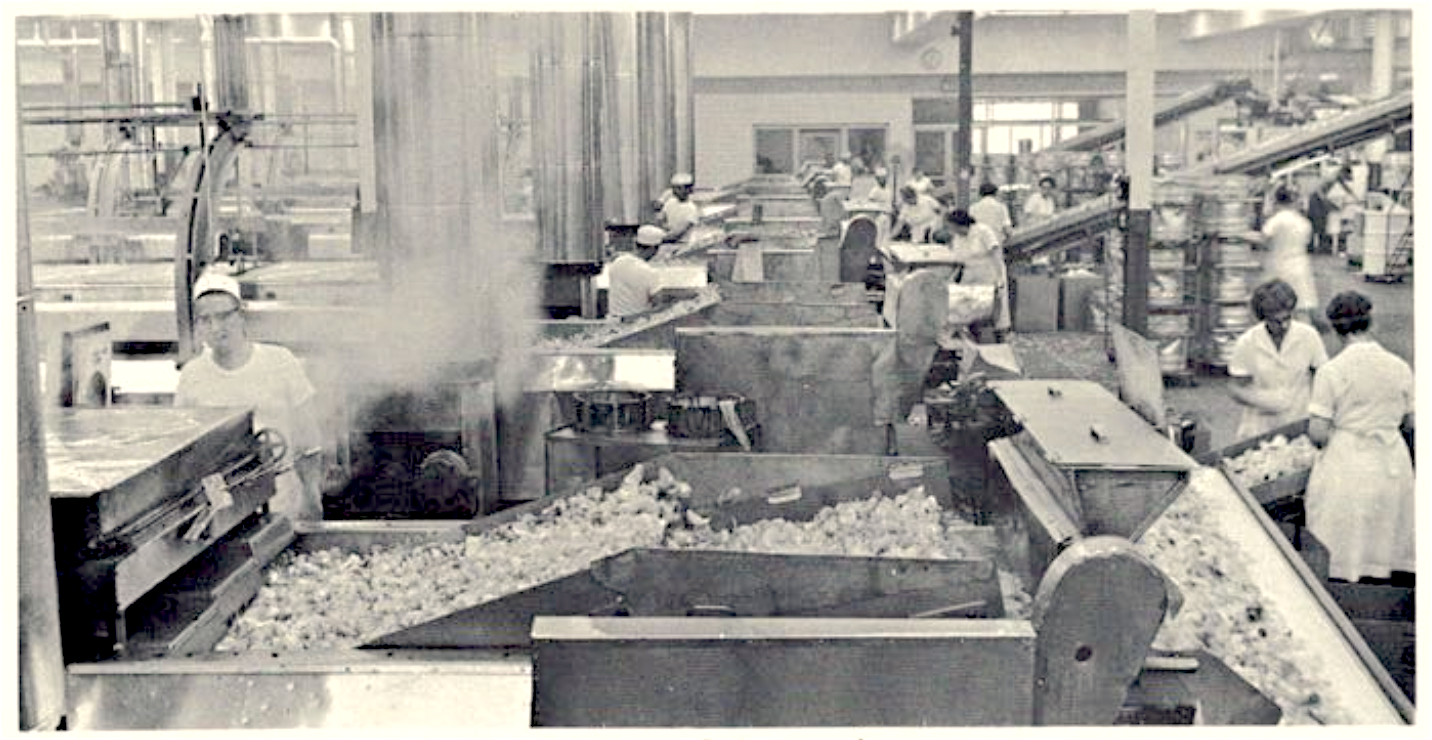
Even for a perfectionist, though, ambition had its limits. For as much as Jays emulated Lay’s in its marketing, it was never going to compete with them on the national stage. The Japp family was more concerned with defending their Midwestern turf, and they held off challengers successfully for decades.
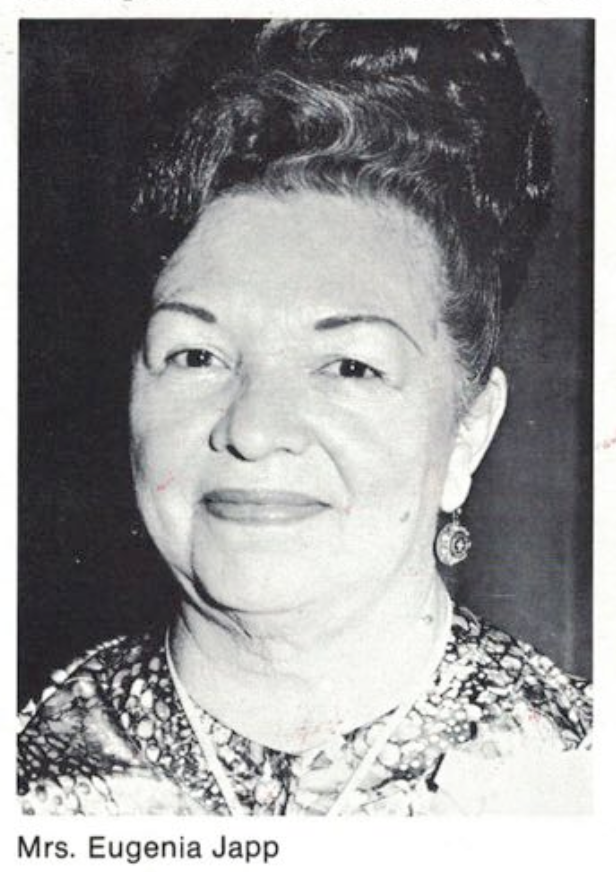 Leonard Japp’s wife Eugenia played an important role in Jays’ sustainability, serving as executive vice president and pioneering the inclusion of chip related recipes on the backs of Jays containers—”potato chip tuna casserole” being her calling card.
Leonard Japp’s wife Eugenia played an important role in Jays’ sustainability, serving as executive vice president and pioneering the inclusion of chip related recipes on the backs of Jays containers—”potato chip tuna casserole” being her calling card.
“Eugenia had great compassion for women who cooked for large families,” Leonard Japp told the Tribune in 1996. “She listened to their concerns and comments and always looked for new ways to stretch the food dollar.”
Eugenia died in 1983, and three years later, with sales still strong, Leonard Japp—now 81—decided the time was right to finally sell the family business. After the company tanked in the next eight years under the unfocused ownership of Borden Inc., however, the Japp family stepped in and bought back the business in 1994—with manufacturing still chugging along at the 99th Street plant; the familiar smell of chips lingering in the air around Cottage Grove Heights.
When Jays returned to the Japps, there were now three generations of the family helping to run the show. Leonard, now in his 90s, was still going strong; his son Leonard Jr. was the new CEO; and grandson Leonard III was soon to become company president. Jays Food, Inc. seemed in good hands for the 21st century.
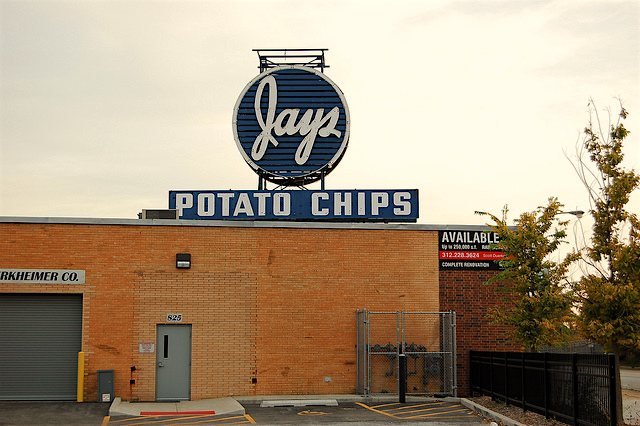
[2010 Photo by Eric Allix Rogers, Flickr]
But this lighthearted tale of snack foods and legacy has a rather stunningly sad ending. In October of 1999, Leonard Japp, Jr. died of an aneurysm at the age of 67. The following spring, tragically, Leonard Japp III died of a heart attack at just 40, improbably leaving the company founder—now 96—as the last living Leonard Japp. Likely heartbroken, Leonard Sr. breathed his last in August of 2000. The Japp family line had been decimated in the span of just ten months.
By 2004, the company was re-sold, and by ’07, it was bankrupt, leading to the closure of the Chicago plant after 50 years in operation. The brand name survives under the ownership of Snyder’s of Hanover, and remains easy to find in any local grocery. As to whether the chips taste the same—nostalgia seems to be a formula consistently difficult to replicate. Maybe if they used a tin instead of a bag?
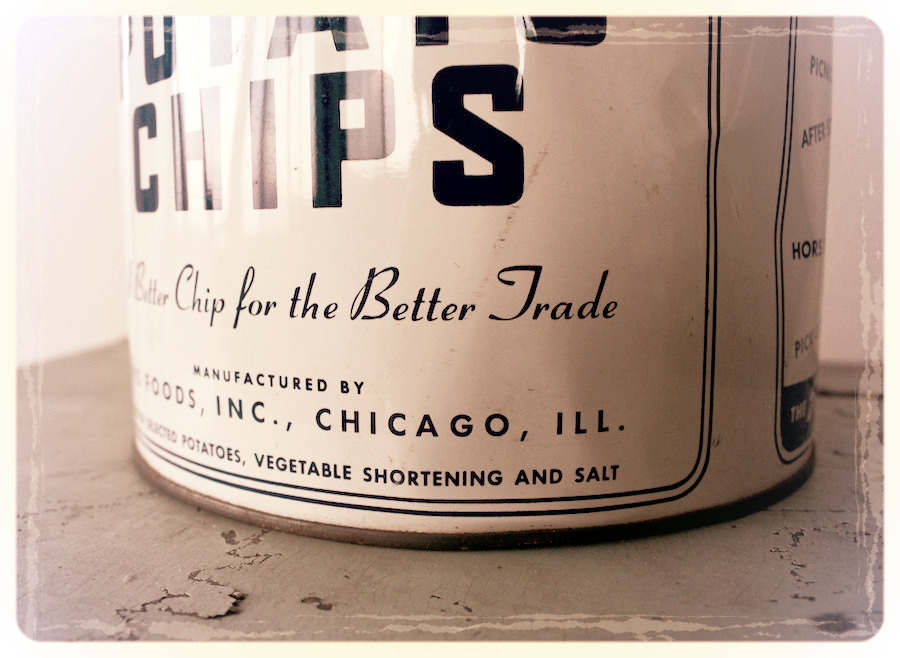
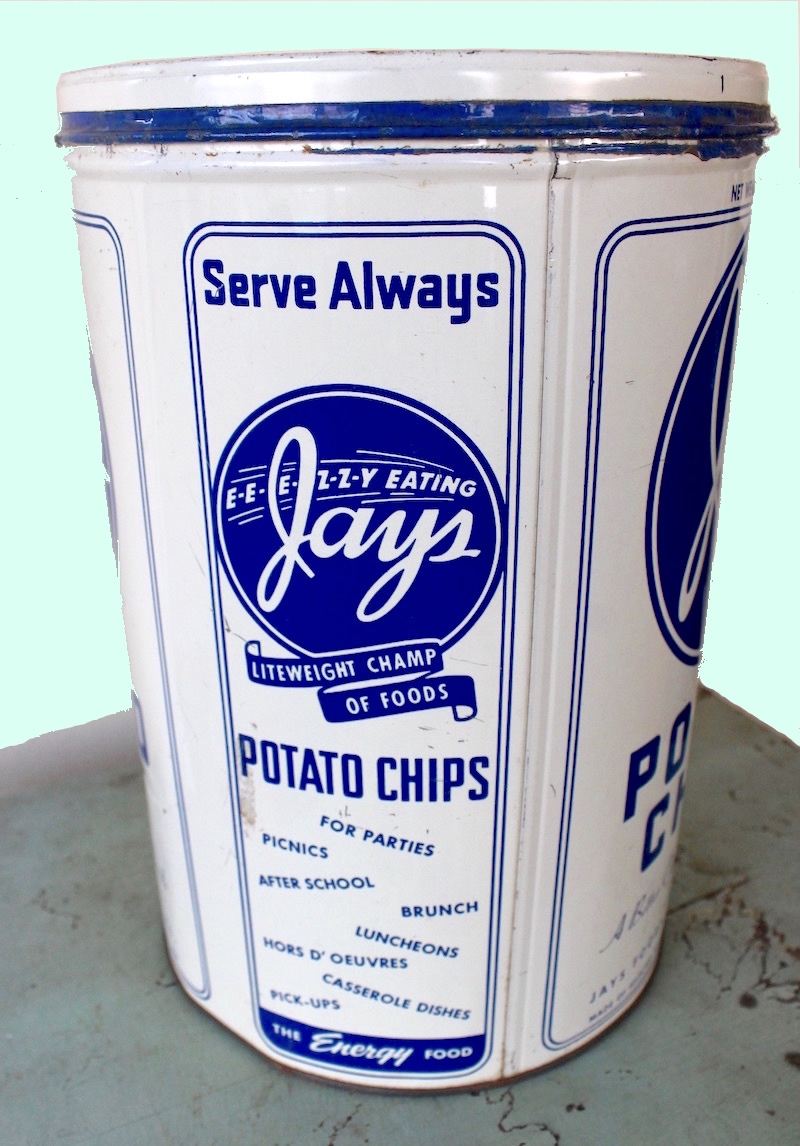
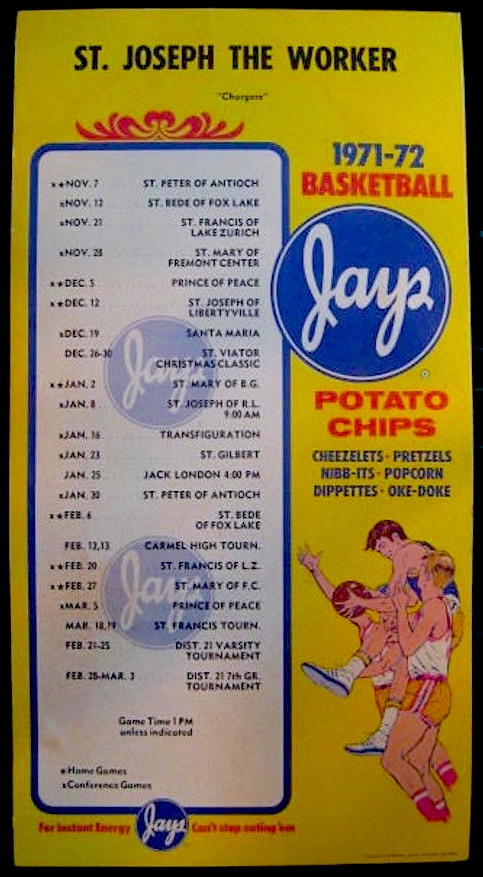 [Jays sponsored basketball schedule for St. Joseph the Worker Catholic School in Wheeling, IL, 1971]
[Jays sponsored basketball schedule for St. Joseph the Worker Catholic School in Wheeling, IL, 1971]
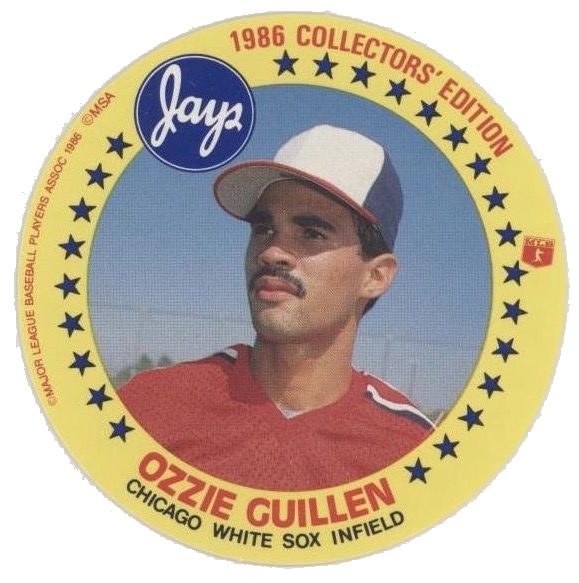 [Like Cracker Jack, Jays sometimes gave away collectibles in its bags]
[Like Cracker Jack, Jays sometimes gave away collectibles in its bags]
[Jays TV ad from 1987, when it was under the ownership of Borden, Inc.]
Sources:
“Jays: Undefeated and Still Champion of Chicagoland Market” – Chipper, 1974
“Potato Chip King: Man of the People” – Chicago Tribune, August 26, 2000
“Jays Founder Japp Wasn’t Always in the Chips” – Chicago Tribune, Nov. 25, 1985
“Jays Potato Chips” – PBS WTTW
Archived Reader Comments:
“Leonard Japp,Sr. was my grandfather. Your story is very accurate. People always ask about him. It was like being Chicago royalty. Thank you for keeping the memories of the original Jays.” –Kathy Whelan Daly, 2020
“The story about mr. Japp picking up coal along the railroad tracks to keep the family house warm and the other odd jobs is very representative of his Generations ability and willingness to busted huh to get whatever they need and not just expect things nor want a trophy for breathing like today’s generation could you even imagine chip or anybody coming out with a company that even inferred or inadvertently hurt somebody’s touchy feelings oh my god there be lawyers coming out of the sky and parachutes great company great product great man ” –Samuel C., 2019
” –Samuel C., 2019
“I worked on the Jays Potato Chips ad account for over 10 years and visited the plant/office on 99th street frequently. The TV ad you show here won many creative awards, including a National Clio (at the time, I was too young to know how important an achievement that was.). Jays was famous for many of its ad campaigns created under the “Mad Men-era” account guy, Jim J. J. Jim convinced the brand to do some very funny and famous radio ads in the 1980s-90s with Dick Orkin’s radio ranch (the famous comedic duo of Dick & Bert, with a staff of funny people including Tom Posten and Dodie Goodman).” –Carol, 2018
“Growing up in chicago in the 60’s, Jays made the best potato chips available in chicago, no others even came close. the store brands tasted horrible and I told my mom to only buy jays.” –Frank, 2017
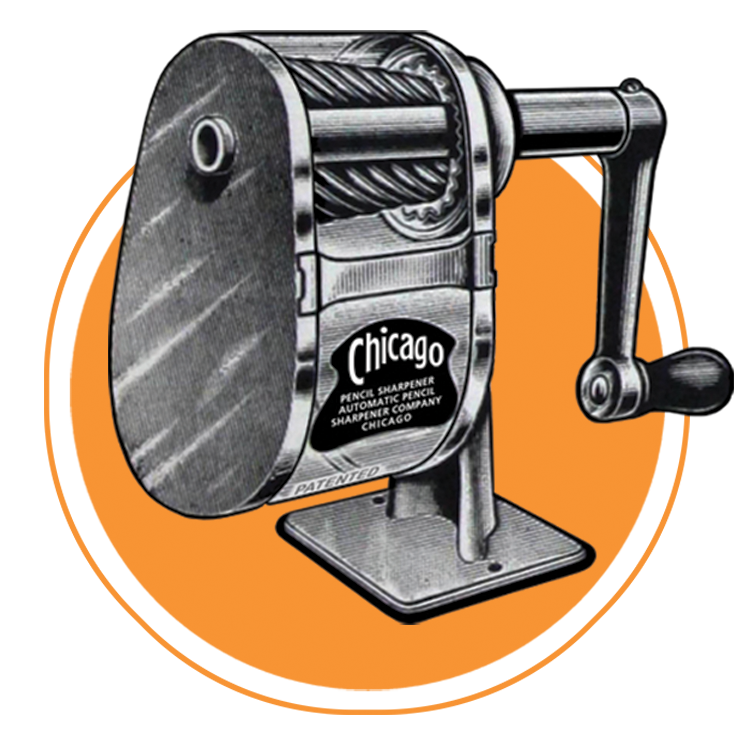
I’m Tony Williams. The first picture shown is also my dad Jack. He was probably the greatest chip salesman there was. I also worked at Jays. Put in over 15 years until the sale and the company was just different. Joe Whelan, Lenny Japp, Si Martilla and of course the Old Man were my teachers and they taught me well. Along with dad.
I grew up in Chicago not far from the Jay’s plant, I loved Jay’s. I left went to MT, my mom would UPS me Jays for years. I moved back to MI, lucky to have my Jays, a few years later I noticed a change in the flavor, yep they sold out. I realize today the difference in Jays and other brands was they were lightly salted so you tasted the potato. I used to say if the wind came from the east you smelled the steel mills, from the south the garbage dump, the west Jays chips, the north you froze. A lot of great memories with Jays, my last was I actually hired a relative of Jays in MI that’s how I found out they were originally called Japp.
Mom worked in the front office and would bring home a box of individual bags that we would give out on Halloween. I would also take a box to school and give bags out to my classmates on my birthday. ‘Can’t stop eatin’ ’em!’
I remember the free pencils in boxes of Jay’s, each year at back-to-school time. Still have one, probably from mid70’s.
I wish Jays Potato Chips were still around. I miss Jays Old Fashioned Kettle Chips. NO ONE makes them like Jays. If I could figure out the recipe I would try to make them myself. These were my favorite chips of all time. I wish someone was able to get Jays up and running again and bring back all the flavors.
I worked in the Pullman neighborhood from 1982 until 2018. The factory at 99th and Cottage Grove still has the Jay’s sign, which is usually taken down immediately after a plant closes. While the plant was still going, you could tell the wind direction by the aroma. From our vantage (115th street), north wind was potato chips!
I wonder if the Japp family focused to the extent presented in the story on Lay’s, which was still a regional brand until the 1960s merger with Frito. But it is a great story overall!
I have a recipe for potato chip cookies that calls for a 25 cent bag of jays. This dates from the mid 1960’s. Can anyone tell me how many ounces this was?
I need to know where the waffle cheddar cheese chip type cracker has been I have not found it in the Illinois or Indiana area?
I want to buy Jays Bar-BQ chips. Where or how can I get them?
My father, Victor Quade, was first cousin to Leonard Japp, who we called Mack. When my Dad moved to Chicago in 1946, he stayed with Mack and Jean, until he found his own place. Mack gave him a job until he could get on his own feet. My grandmother, Adeline Stellmacher Quade, and Mack’s mother, Lydia, were sisters. Before my parents married, my Mom lived at 41st and Princeton, kitty corner from the plant. That’s how my parents met. My Dad would leave the Jays plant, where he drove a delivery truck, and my Mom would sit on her porch and watch for him. My Mom eventually worked in the plant part-time, as a second job. She told some great stories about working there! Years later, they had already moved to the suburbs, taking other jobs. But we always stayed in touch with Mack, his brother, Larry, and the whole family. I grew up in what became Burbank, IL. The Jays truck used to deliver a case of chips almost every month to our home when I was a little girl. Everybody is gone! But those memories live on, for sure.
That’s a wonderful memory, Vicki. If you would like to have your parents’ story included as part of our Jays article, we’d be happy to include to. Any photos or ephemera you have from your parents time with the company would be welcome to include. You can send digital versions of any of these to contact@madeinchicagomuseum.com and we will add them in to the article on this page. –Andrew Clayman, curator, Made In Chicago Museum
In 1980 I was in charge of the Village of River Forest Centennial Picnic. I called up Leonard Japp and asked him if it would be possible to have small bags of Jays Potato Chips at our Sunday picnic. He asked how many? I told him I could only guess a couple thousand. He said that he would send over 5000 bags, freshly made, right from the factory on Sunday morning, complements of the Jays Potato Chip Company. Retired River Forest Police Lt. Harry Blesy
I babysat Kathy Whelan. I lived behind her in Oaklawn till 61. Nice family. Great chips.
In the 1960’s the potato chips were the best tasting out there.Maybe one of you can tell me what happened in the following years… they did not taste the same at all. I think it was probably the oil they used that made all the difference. So what type of oil were they using in the 60s versus what they use later and maybe now, because it did not cut it. They were so delicious in the 60s can somebody please answer that question for me, I have wondered that for years. Thank you.
I have great memories of Jays potato chips when it was located on 99th and cottage Grove I worked there doing the middle 70s i had a great time i recalled when my wife went in labor in 1980 and my son was born i had to leave work and I made just in time so many memories i enjoyed my job and the people that i worked with!!!
My Uncle, George Gavora, was Leonard Japp’s first partner. The story on the internet did not describe how they broke up. My uncle took the factory and Leonard took the trucks and distribution business and the name he changed to Jay’s. My uncle George changed his business to Honey Bee potato chips and soon went out of business.
My mother worked at 40th Princeton when it was Japp potato chips, I worked for Jay’s in 1965 for 2 years at 99th Cottage Grove ,$1.30 hr paycheck Friday with 2 bags of 25 cent chips. Mr. And Mrs Japp would come into the plant Mrs.Japp was in a wheelchair ,I was 18 years old they would call to office to bring his black Cadillac to front of building,boy was I something great memories.
This is a wonderful story of the Jays Potato Chip company. I had an uncle, Merith Riechers who was driver for Jays in the far south side of Chicago and Gary Indiana, Dolton & Riverdale taverns for about 40 years. Uncle Merith would always bring Jays chips to family events at my mothers home in Beecher, Ill. He would often tell stories of the early days of Jays chips and the information above sounds like what uncle Merith would say about the Japp family & getting his chips at the south Chicago factory on 99th St. Interestingly, I have a cousin, Don Riechers that also delivered Jays chips to businesses in the. south side of Chicago & we have a Jays chips can at our home in Pennsylvania that my mother used to store chocolate chips at the Christmas season. What a wonderful small world.
Re: Jay’s factory photos
To whom it may concern…
I’m a retired builder in Chicago. Many years ago, at a demolition or repurposed building site, I came across a dusty old binder containing 14 black & white 8×10 photos of the Jay’s factory, its offices, personnel, etc., in rather good but dirty condition. The photos were all professionally taken in June of 1945 by “Kaufmann & Fabry” photographers.
Not wanting to see them destroyed and believing they’d be of historic or nostalgic value to someone, I saved the photos intending to reunite them with an appropriate party. As things do, however, I lost track of them until recently. If your organization could provide me the email address of an interested party, I can scan the photos and forward them as a PDF for review. If an address is provided, I can forward the originals via USPS.
I can’t just throw these away. They’re just too cool. And I know somebody has to want them.
Hope you can help. Thanks.
Regards,
Paul Cecchini
We would love to include these images in our Jays article, Paul. Please contact us at contact@madeinchicagomuseum.com
Back in the early 60’s when i was a child, we had a family friend who lived in the Green Lake/Ripon area in Wisconsin. One Christmas she brought us a drum (metal) about 3 feet high filled with Jays potato chip seconds. They were a little overdone, slightly browned and so delicious! The metal drum was white and had the blue “Jays” logo. I’m not sure, but I thought she had gotten them at a Jays factory near where she lived. Was there a Jays factory in the area?
I have a recipe for “Potato Chip Cookies” that is dated 1971calling for a 25 cent bag of Jay’s Potato Chips.
Question: How may ounces was a 25 cent bag of Jay’s Potato Chips back in 1971?
I BELIEVE I HAD A YELLOW JAYS POTATO CHIP CAN THAT WAS THE SAME SIZE AND SHAPE AS THE WHITE ONE BUT I DON’T SEE AND SIGN OF YOU EVER MAKING ONE .
DID YOU EVER MAKE ONE OR AM I IMAGINING IT?
I would love any pictures of Jay’s potato chips. Workers, machines, inside or outside of the factory. Anything that had to do with Jay’s. I grew up eating them and their shoestrings. I use to watch the semis dump the potatoes from CSU but I couldn’t see it very well.
Here is my email address if anyone would like to share pictures.
Thanks
Marilyn
mcarlson58@comcast.net
It was 1969 when I first met Leonard Japp. As advertising and promotion manager for Central Grocers (known to many as Centrella Foods) I had set a meeting with Leonard at our office in Franklin Park, IL. to develop an advertising plan on Jay’s Potato Chips. It would be supported by the 400 independent grocers we supplied in Chicago and the surrounding suburbs. Central did not inventory Jay’s Chips, but we did provide “store door / drop ship” brands like Jays access to our weekly ad program in the Chicago Daily News. It was the first of many meetings we would have. Upon leaving he spent a moment admiring the collection of old grocery packaging displayed in my office.
When he arrived for a follow-up meeting some weeks later he was carrying a brown paper grocery bag and handed it to me saying “here’s something to add to your collection”. It contained one of the company’s early cans of Mrs. Japp’s Potato Chips which he indicated had been in his garage for years holding old paint brushes !
As we talked about renaming the brand from Mrs. Japp’s ( used prior to the war with Japan) to Jays he indicated other names had been considered. Jays however provided both a subtle comparison to Lay’s Chips, but more important “y” is the only letter in the alphabet that when written in cursive creates a close visual appearance to the “pp” in Japp’s. Retaining the appearance of the company’s logo was a definite plus!
Now more that 50 years later my collection of large snack / chip cans from the 30’s,40’s &50’s includes Jays regular and butter popcorn plus both Japp’s and Jays Potato Chips.
I feel fortunate to have known Leonard Japp Sr. He was a pioneer in the development of the supermarket industry and a truly great person who deserved all the accolades that came his way !
Russell Toms
Sure wish I could find a pic of the semi’s being unloaded. They used to elevate one end of the semi-trailer so the potatoes would empty out. Anyone else remember seeing that?
David Potete I have a photo I could email to you. Don’t know how to attach a photo here. My email is crane699@yahoo.com if your interested email me.
Fun fact, each truck held 50,000#’s!
It’s my dad, Jack C. Williams, in the first picture with the chips on the hand cart. He worked for Jays for 50 years. I, Jack M. Williams, his son, also worked for Jays in Kalamazoo MI and South Holland IL.
Kathy Whelan Daly – The first meal I ever cooked was a potato chip casserole, made with chips, cream of mushroom soup, tuna and peas. I’ll never forget putting the dish into the oven, turning on the gas, going for the match, lighting the oven and poof! It burned my bangs, eyebrows, eyelashes and there was a distinct smell of burning hair in the air, but no real harm was done. Boy, I learned my lesson!
It was my favorite birthday meal (I was born in 1951) and my children loved it, too. When I read about it today in Ocean Robbin’s blog, I searched and found this site in the hopes of getting a copy of the ORIGINAL recipe. Is is possible to share it with me? Thanks so very much!
I took care of Leonard Sr. For many years I was his driver and his right hand man. At the time my mother in law was married to him for many years. Her name was Janice Japp. I was in his home in Oak Brook IL. He died there.
Did you used to make onion and garlic potato chips and sell them in a single serve bag?i think you did and they were the best. Why did you stop making them? I used to eat them all the time in the 70’s. Nobody makes a decent one anymore.
We are not Jays Foods. This is a museum that researches Chicago companies of the past.
I’d heard that my grandfather, Harry G. Moisan, was a part owner of Jays potato chips at one point early on. Not sure if this is true or misinformation. Would you be able to tell me if he was. Thank you very much. Judy Moisan Bokhart